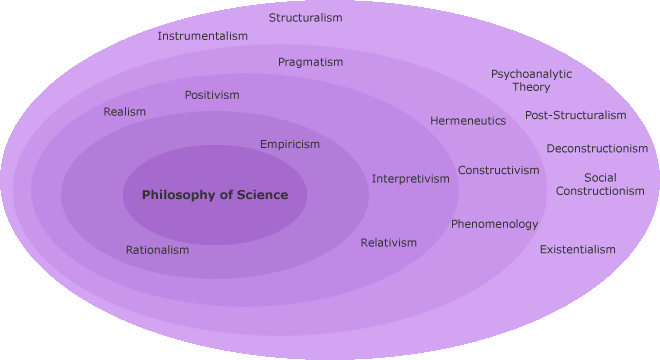Philosophy of Science

Orientations in the philosophy of science refer to world views and ways of thinking related to understanding the nature of knowledge and reality. These orientations form the basis of the methodological choices in research. The orientations in philosophy of science form a background for research strategies, data collection and data analysis. Knowing the orientations in philosophy of science is an essential part of the research. Orientations can be seen both as timeless starting points in scientific thinking and as historical ways of understanding the world. From the historical perspective, some orientations are more influential than others in scientific thinking during the history of science. However, contradictory orientations can exist and influence science at the same historical period of time.
Ideas of the nature of knowledge and reality differ in orientations of the philosophy of science. Discussion of the nature of knowledge and reality are consistent with the concepts of epistemology and ontology. In epistemology (theory of knowledge), the interest is in discussions on what and how people can know things and what kind of knowledge is right knowledge. In ontology, the interests are in discussions on what reality is and what kinds of phenomena are real.
Orientations in the philosophy of science are fundamental views, which develop into more focused points of view. The interactive graphic above illustrates those orientations which are either typical to humanistic research or are significant to know from the stand point of humanistic research. The interactive graphic illustrates the fundamental and developed views through their distance from the centre. The figure also illustrates the relationships of the orientations. In the centre of the figure, there are the orientations of rationalism and empiricism, whose basic starting points are contradictory to one another.
Located close to empiricism are the orientations of positivism and interpretivism, both formed from empiricism and which form a fundamental division in modern science. These orientations form both ontological and epistemological contradictions to one another. The orientations of realism and relativism are closely linked to the previously mentioned orientations. The orientations of hermeneutics, constructivism and phenomenology are closely based on interpretivism and relativism. Existentialism is linked to the points of view of phenomenological thinking. Social constructionism, deconstructionism, post-structuralism and psychoanalytical theory are linked more or less closely to the orientations of constructivism and hermeneutics. Pragmatism can be perceived as an orientation, whose points of departure are not straight located in positivism or interpretivism. Structuralism has connections to pragmatism. Instrumentalism is also linked to pragmatism, but due to their individual points of view these two orientations stand out from the other orientations based on interpretivism. The orientations displayed in the interactive graphic function as links to more detailed explanations
Get to know the relationships of the orientations in the philosophy of science through the links below.
History of Philosophy. Philosophical society.
Ramos-Poquí, Guillem and Rodway, David, 1990. Philosophy Chart.
Theories and sociology of the history of science. Wikipedia, The Free Encyclopedia.
Shuttleworth, Martyn, 2009. History of the Philosophy of Science. Experiment Resources.
Philosophy. Wikipedia, The Free Encyclopedia.
